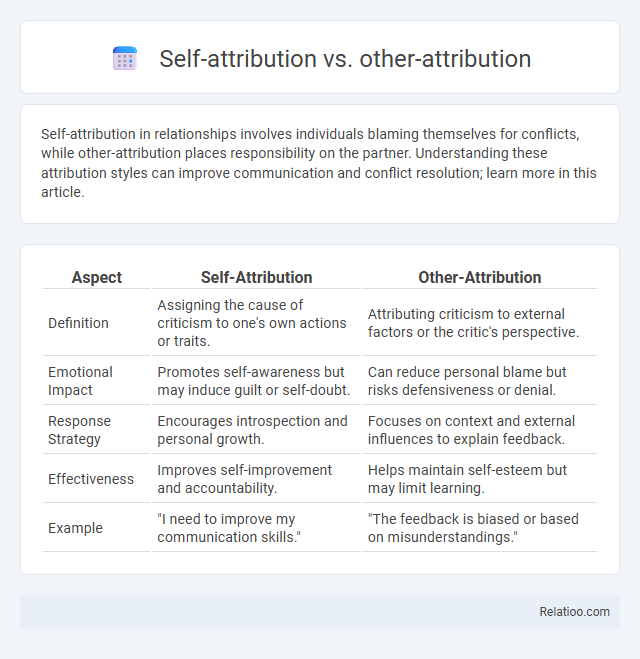Self-attribution in relationships involves individuals blaming themselves for conflicts, while other-attribution places responsibility on the partner. Understanding these attribution styles can improve communication and conflict resolution; learn more in this article.
Table of Comparison
| Aspect | Self-Attribution | Other-Attribution |
|---|---|---|
| Definition | Assigning the cause of criticism to one's own actions or traits. | Attributing criticism to external factors or the critic's perspective. |
| Emotional Impact | Promotes self-awareness but may induce guilt or self-doubt. | Can reduce personal blame but risks defensiveness or denial. |
| Response Strategy | Encourages introspection and personal growth. | Focuses on context and external influences to explain feedback. |
| Effectiveness | Improves self-improvement and accountability. | Helps maintain self-esteem but may limit learning. |
| Example | "I need to improve my communication skills." | "The feedback is biased or based on misunderstandings." |
Understanding Attribution: Self vs. Others
Understanding attribution involves recognizing how you interpret the causes of behavior, either attributing actions to yourself (self-attribution) or to others (other-attribution). Self-attribution focuses on internal factors like your skills or efforts, while other-attribution assigns causes to external circumstances or other people's actions. Your awareness of these distinctions enhances interpersonal communication and personal accountability by clarifying the origins of behaviors.
Defining Self-Attribution in Psychology
Self-attribution in psychology refers to the process by which you explain your own behaviors, decisions, and emotions, attributing them to internal factors such as personality traits or effort. This contrasts with other-attribution, where causes are assigned to external factors or characteristics of others. Understanding self-attribution helps improve self-awareness and accountability by clarifying how you interpret your own actions and motivations.
Key Concepts of Other-Attribution
Other-attribution involves assigning causality or responsibility to external agents or situational factors rather than oneself. Key concepts include external locus of control, where individuals perceive outcomes as influenced by outside forces, and situational attribution, emphasizing the role of environmental and contextual elements in explaining behavior or events. This contrasts with self-attribution, which centers on internal factors like personal traits or abilities.
Cognitive Biases in Attribution
Self-attribution bias occurs when individuals credit their successes to internal factors like ability or effort while blaming failures on external circumstances, enhancing self-esteem. Other-attribution bias involves attributing others' behavior primarily to dispositional traits rather than situational influences, often leading to the fundamental attribution error. Attribution as a cognitive process is crucial for interpreting social interactions but is frequently distorted by biases such as actor-observer bias and confirmation bias, impacting interpersonal judgments and decision-making.
Factors Influencing Self-Attribution
Self-attribution is influenced by factors such as individual motivation to maintain a positive self-concept, cognitive biases like the self-serving bias, and situational awareness that shapes how people explain their own behavior. Other-attribution involves attributing actions and outcomes to external entities, relying on observable behavior and social context cues. Understanding these attribution processes helps in differentiating internal versus external causal explanations in social psychology.
The Role of Culture in Attribution Styles
Culture significantly shapes attribution styles, influencing whether individuals favor self-attribution or other-attribution when explaining behavior. Collectivist cultures tend to emphasize other-attribution, attributing actions to social roles, relationships, and situational factors, while individualist cultures lean toward self-attribution, highlighting personal traits and intentions. Understanding these cultural differences is crucial for interpreting behavior accurately across diverse social contexts and avoiding attribution errors.
Impact of Self-Attribution on Mental Health
Self-attribution, the process of assigning causes to one's own behavior, significantly influences mental health by shaping self-esteem and emotional wellbeing. Positive self-attribution fosters resilience and motivation, while negative or distorted self-attribution, such as self-blame or internalizing failure, can lead to anxiety, depression, and lowered self-worth. Understanding the contrast between self-attribution, other-attribution, and general attribution reveals how internal explanations directly impact psychological health and coping mechanisms.
Consequences of Other-Attribution in Relationships
Other-attribution in relationships often leads to misunderstandings and conflicts as individuals assign blame or intent to their partner's actions without self-reflection, undermining trust and emotional intimacy. This external focus can hinder effective communication, increase negative emotional responses like resentment, and promote defensive behaviors, thereby weakening the relational bond. Persistent other-attribution reduces empathy and problem-solving capacity, escalating relational dissatisfaction and increasing the risk of relationship breakdown.
Strategies to Balance Self and Other-Attribution
Balancing self-attribution and other-attribution involves recognizing your own role in outcomes while accurately assessing external influences to maintain objective perspective and avoid bias. Effective strategies include practicing reflective self-assessment, seeking diverse feedback to understand others' viewpoints, and applying attribution training to enhance awareness of situational and dispositional factors impacting behavior. Your ability to integrate self-awareness with empathy improves interpersonal relationships and decision-making accuracy.
Practical Applications in Everyday Life
Self-attribution involves assigning causes to your own behavior or outcomes, influencing personal accountability and motivation in daily decisions. Other-attribution refers to attributing causes to the actions or behavior of others, which can affect interpersonal relationships and conflict resolution strategies. Understanding these attribution types enhances emotional intelligence and helps you navigate social interactions more effectively by recognizing the reasons behind behaviors and outcomes.

Infographic: Self-Attribution vs Other-Attribution
 relatioo.com
relatioo.com